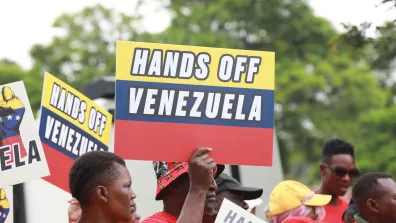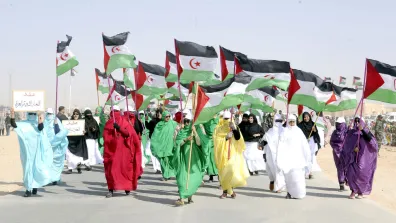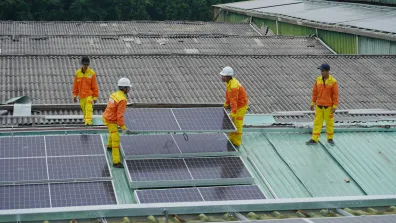Bad Company – BP, human rights and corporate crimes
Ahead of the announcement of the winner of the BP Portrait Award on Tuesday 20th June, our friends at Culture Unstained issued a formal complaint to the National Portrait Gallery, alleging BP’s human rights record breaches the Gallery’s own ethics rules.
- On the eve of the BP Portrait Award announcement, they made the Gallery’s Ethical Fundraising Policy public for the first time
- This was accompanied by a a new report which shines a spotlight on BP’s close ties to rights violating regimes around the world including Azerbaijan, Egypt, Indonesia and Mexico
- The formal complaint sets out how the recent BP sponsorship deal breaches the Gallery’s clause on human rights and calls for BP to be dropped
You can get the full details of the formal complaint and view the report, ‘Bad Company – BP, human rights and corporate crimes’ here.
War on Want contributed to the report by highlighting the extent of the impact of BP's operations on the lives and lands of thousands of Colombians. See below:
BP in Colombia
BP sold its assets in Colombia eight years ago following the Deepwater Horizon disaster in the Gulf of Mexico. However, concerns remain today about BP’s time in Colombia, its impacts on communities and the need for truth about any links BP had to rights violations in the country:
- During its time in Colombia, BP made payments to the Ministry of Defence, the Colombian Army and others in order to protect its oil facilities
- In 2006, BP reached a settlement with a group of Colombian farmers following their allegation that the construction of the Ocensa pipeline – in which BP played a central role – had damaged the environment
- Questions have been raised about the extent to which BP benefitted from the human rights abuses perpetrated by paramilitary groups along the pipeline
BP’s business
BP started oil exploration and extraction in Colombia in the 1990s as part of an international consortium of oil companies, after ‘discovering’ two of the largest oil fields in Latin American history: Cusiana and Cupiagua. To be able to transport the crude oil, the consortium had to construct the 450-mile (720km) Ocensa pipeline. In 2010, BP sold its assets in Colombia for $1.9bn to help pay for the clean-up of Deepwater Horizon oil spill and its devastating impacts.[1] As the company exited Colombia, it left behind a long list of claims regarding serious human rights abuses and environmental destruction, as well as a community which continues to live in deep, extreme poverty.
Funding repression at the hands of the Colombian government?
BP, like other oil companies operating in Colombia at the time, paid a government tax of $1 a barrel to help finance army and police protection of oil facilities. Journalists who investigated BP’s security provision found that in 1995, BP agreed to provide $2.2m out of a contract with the Colombian Ministry of Defence worth $11.6m. Throughout BP’s time in Colombia it made a series of payments to the Colombian army, the Ministry of Defence; as well as to Israeli security company, Silver Shadow and UK-based Defence Systems Limited to provide security to its installations in the region[2].
The UN estimates that 3,000 trade union activists were murdered and 6,000 more were disappeared in the Casanare region over the last 30 years. Many of the victims were unionists working in the oil industry, or social leaders in oil-producing regions.[3] However, their violent targeting by government-linked paramilitaries went largely unnoticed outside Colombia because of the civil war raging between the Colombian state and the FARC armed forces.[4]
Even though it has been well established that BP benefitted from the paramilitary violence that was being unleashed on rural populations during the time of its operations[5], it has been more and more difficult to determine – in legal terms – the level of responsibility of the company for these grave impacts.[6] For the victims of such heinous crimes the link couldn’t be clearer, it is a reality well known in Colombia: the economic interests of big multinational extraction companies have always been accompanied by violence.
The need for truth
In the last quarter BP made higher than expected profits of $1.51 billion. Meanwhile, according to Colombia’s National Office of Statistics, in 2013 the rate of poverty for Casanare surpassed 56%; rural communities experience rates of poverty reaching 77%. Only 19% of urban areas and 6% of rural areas have access to sewage and clean water[7]. There are also many areas of land affected by historic oil extraction that are polluted or too dry to use for traditional farming[8].
At this crucial moment in Colombia’s history – when it seeks to implement a historic peace agreement – truth is a necessary condition for peace and for justice. The countless victims of the armed and social conflict in Colombia need to know the truth about what happened to their families and loved ones. This includes clarity on the involvement of multinational companies in those violations and abuses; it also requires, most importantly, a decisive effort to help re-build entire communities with adequate access to basic services and fulfilment of their economic and social needs.
Legal claims and allegations against BP
In 2012, the law firm Deighton Pierce Glynn, ‘filed a damages claim case in the High Court which included a claim for false imprisonment, torture and assault against BP and 6 other oil companies registered in the UK’.[9] The central allegation in that case was made by Colombian trade unionist, Gilberto Torres, regarding his kidnap, torture and imprisonment for 42 days by a paramilitary group in the Casanare region. Evidence suggested that Ocensa, the company behind a controversial pipeline that Torres and his union colleagues had raised concerns about, had been involved in the commissioning of his kidnapping.
Gilberto’s lawyers argued that because BP held a 15.2% stake in Ocensa at the time and had close ties with the company, its failure to address concerns about human rights meant that it was liable for damages.[10] However, Gilberto was advised last year to discontinue the case given its complex technical nature and that the ‘procedural and financial challenges were too great’. As Deighton Pierce Glynn noted on their website, ‘there is no equality of access to justice between a multinational oil company and an exiled trade unionist’.[11]
In 2006, a group of Colombian farmers began proceedings in the English High Court against BP Exploration Company alleging that the Ocensa pipeline had damaged the local environment. They alleged that while BP was not directly involved, it had benefitted from the actions of paramilitary groups who were guarding the pipeline. They farmers argued that, ‘the paramilitaries intimidated the local population, obstructed farming and suppressed legitimate opposition to the pipeline’.[12]
Following mediation, the two parties reached a settlement in 2006 where BP ‘agreed to establish an Environmental and Social Improvement Trust Fund for the benefit of the farmers’. However, the scale of the full agreement and its terms were not released. It was suggested that while it was not thought to be as high as the £15 million originally sought by the farmers, that it ran to several million pounds. In 2008, a separate group also brought a claim against BP concerning damage caused to their land by the construction of the Ocensa pipeline. The trial, which began in 2014, was subsequently dismissed last year in the UK High Court, after it was ruled that there was insufficient evidence.
The Oil Justice Project, an initiative organised by War on Want, Deighton Pierce Glynn and the Colombian NGO COS-PACC, seeks to amplify the voices of communities affected by Big Oil in Colombia who are searching for justice for human rights abuses and environmental destruction to their territories. It does this through raising awareness about historic and ongoing human rights abuses; supporting bottom-up community empowerment projects which re-build the social fabric of communities; and engaging in strategic litigation against Big Oil companies at the national and international level.
[1] ‘Ecopetrol compra la BP en Colombia’, El Espectador, 3rd August 2010. See:
http://www.elespectador.com/economia/articulo-216893-ecopetrol-compra-bp-colombia
[2] ‘BP hands “tarred in pipeline dirty war”’, The Guardian, 17th October 1998. See:
https://www.theguardian.com/world/1998/oct/17/1
[3] ‘”I was kidnapped, chained and blindfolded. They’d kill me if I went back to Colombia’”, The Guardian, 25th October 2015. See:
[4] ‘To Count the Uncounted: An Estimation of Lethal Violence in Casanare’, Benetech Human Rights Program, 10th February 2010. See: https://hrdag.org/content/colombia/results-paper.pdf
[5] ‘BP pays out millions to Colombian farmers’, Independent, 21st July 2006.
[6] ‘Colombia: High court ends trade unionist’s case against BP’, War on Want – News, 13th October 2016. See:
http://www.waronwant.org/media/colombia-high-court-ends-trade-unionist%E2%80%99s-case-against-bp
[7] ‘Diálogo Regional Para La Construcción Del Plan Nacional De Desarrollo 2014-2018’, 29th January 2015. See:
[8] ‘BP faces damages claim over pipeline through Colombian farmland’, The Guardian, 11th November 2009. See:
https://www.theguardian.com/world/2009/nov/11/colombia-farmers-sue-bp-pipeline
[9] ‘Gilberto Torres BP Case Ends But Opens Doors’, Deighton Pierce Glynn website, 13th October 2016. See:
http://www.dpglaw.co.uk/gilberto-torres-bp-case-ends-opens-doors/
[10] ‘Gilberto Torres survived Colombia's death squads. Now he wants justice’, The Guardian, 22nd May 2015. See:
[11] ‘Gilberto Torres BP Case Ends But Opens Doors’, Deighton Pierce Glynn website, 13th October 2016. See:
http://www.dpglaw.co.uk/gilberto-torres-bp-case-ends-opens-doors/
[12] ‘BP lawsuit (re Colombia)’, Business & Human Rights Resource Centre. See: https://business-humanrights.org/en/bp-lawsuit-re-colombia#c9345


